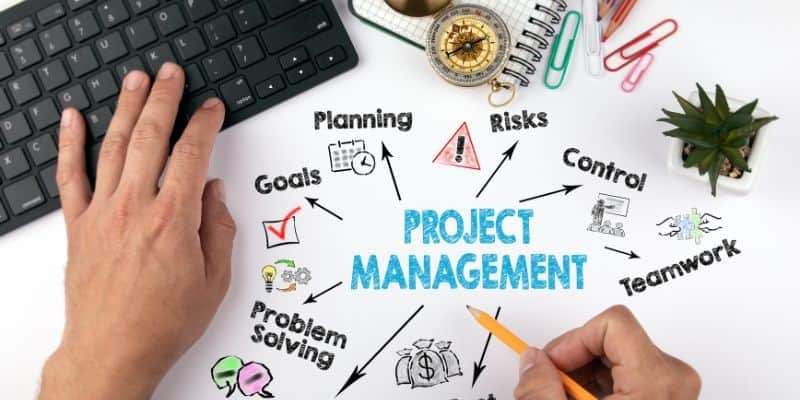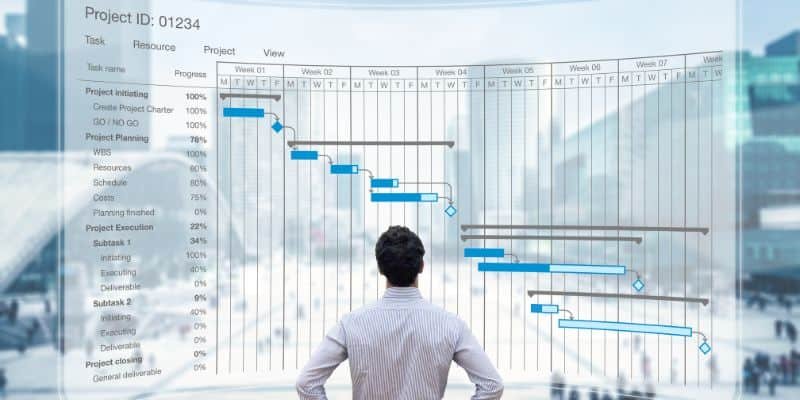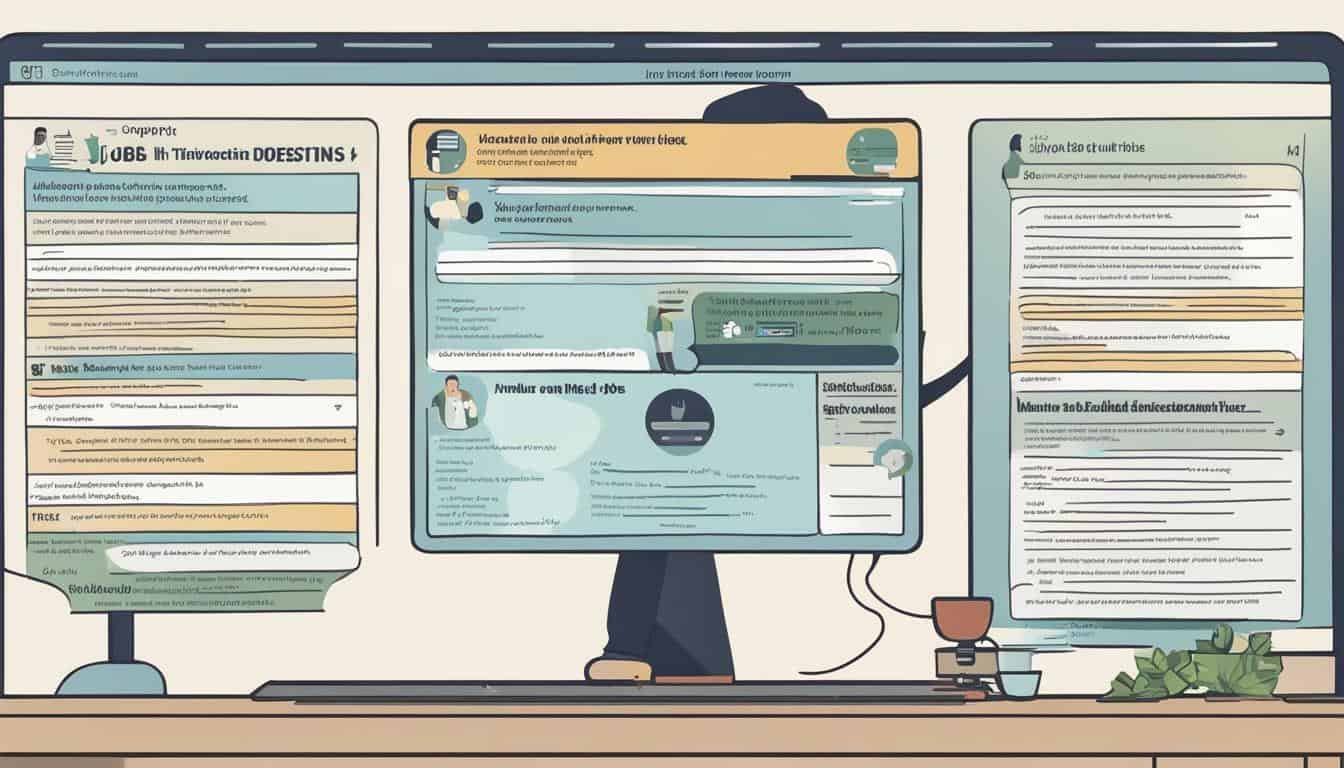In today’s fast-paced and competitive business landscape, project managers play a pivotal role in driving success and achieving organizational goals.
They possess a unique blend of skills, expertise, and leadership qualities that enable them to navigate complex projects and lead teams toward excellence.
In this comprehensive guide, we will delve into the world of project management, exploring the key responsibilities, methodologies, and strategies that make project managers indispensable assets in any industry.
Key Skills and Qualities of Project Managers
Project managers are more than just task coordinators; they are leaders who inspire and guide teams to accomplish remarkable results. To excel in this role, project managers must possess the following essential skills and qualities:

Leadership and Communication Skills:
Effective project managers possess strong leadership abilities. They can inspire, motivate, and guide team members toward achieving project goals. Exceptional communication skills enable them to articulate ideas, provide clear direction, and foster collaboration among stakeholders.
Problem-Solving and Decision-Making Abilities:
Projects often encounter unforeseen challenges and obstacles. Project managers excel at problem-solving, identifying issues, analyzing alternatives, and implementing effective solutions. Their decision-making prowess ensures that projects stay on track and align with business objectives.
Time and Resource Management Expertise:
Successful project managers are masters of time and resource management. They understand the importance of setting realistic timelines, allocating resources efficiently, and optimizing productivity. They ensure that projects are completed within budget, on schedule, and to the highest standards of quality.
Adaptability and Flexibility:
In a dynamic business environment, project managers must be adaptable and flexible. They navigate change with ease, adjusting project plans, and strategies to accommodate evolving requirements. Their agility enables them to embrace innovation, seize opportunities, and drive success.
Stakeholder Management and Collaboration:
Project managers are skilled in stakeholder management, fostering positive relationships, and ensuring effective collaboration. They engage with clients, team members, executives, and other stakeholders to align expectations, manage risks, and maintain open lines of communication throughout the project lifecycle.
Project Management Methodologies
Project management methodologies provide structured frameworks for executing projects. Here are some commonly used methodologies:
Waterfall Methodology:
The waterfall methodology follows a linear sequence of project phases, including initiation, planning, execution, monitoring, and closure. Each phase must be completed before moving on to the next, ensuring a systematic approach to project management.
Agile Methodology:
Agile methodology promotes adaptive planning, iterative development, and continuous improvement. It emphasizes flexibility, collaboration, and rapid responses to change. Agile frameworks such as Scrum and Kanban have gained popularity for their ability to deliver value incrementally.
Hybrid Methodologies:
Hybrid methodologies combine elements of both waterfall and agile approaches. They allow project managers to tailor the methodology based on project requirements, striking a balance between predictability and adaptability.
Choosing the Right Approach for Different Projects:
Project managers must evaluate project characteristics, stakeholder needs, and organizational culture to select the most suitable methodology. Understanding the strengths and limitations of each approach empowers project managers to make informed decisions.
In the next part of this guide, we will explore the project initiation and planning phase, and how project managers lay a strong foundation for successful project execution.
Project Initiation and Planning
Before embarking on any project, project managers must lay a solid groundwork for success. The initiation and planning phase sets the direction, establishes project objectives, and defines the roadmap for execution. Here are the key steps involved:
Defining Project Goals and Objectives:
Clear and measurable project goals are the driving force behind successful outcomes. Project managers work closely with stakeholders to determine the desired results and align them with organizational objectives. Establishing SMART (Specific, Measurable, Achievable, Relevant, Time-bound) goals ensures clarity and focus throughout the project.
Conducting a Thorough Project Analysis:
A comprehensive project analysis helps project managers understand the scope, requirements, and potential challenges associated with the project. They conduct feasibility studies, stakeholder analysis, and risk assessments to gain valuable insights and make informed decisions.
Developing a Project Charter and Scope Statement:
The project charter serves as the foundation document, outlining the project’s purpose, objectives, stakeholders, and high-level timeline. It provides a clear project definition and sets the boundaries of what is within and outside the project’s scope.
The scope statement further defines the project deliverables, constraints, and assumptions.
Creating a Comprehensive Project Plan:
Project managers create detailed project plans that outline the specific tasks, timelines, and resources required for successful execution. They break down the project into manageable phases, develop work breakdown structures, and assign responsibilities to team members.
The project plan acts as a roadmap, guiding the team throughout the project lifecycle.
In the next section, we will explore project execution and monitoring, where project managers put their plans into action and ensure project progress.
Project Execution and Monitoring
Once the project plan is in place, project managers oversee the execution phase, ensuring that activities are carried out effectively and efficiently.
They also monitor progress, track performance, and make necessary adjustments to keep the project on track. Here are the key aspects of project execution and monitoring:
Establishing Project Milestones and Deliverables:
Project managers define project milestones, which are significant achievements or events throughout the project.
These milestones help track progress and provide a sense of accomplishment. They also establish clear deliverables and ensure that they are completed within the specified timeframes.
Managing Project Teams and Resources:
Project managers play a crucial role in assembling and managing project teams. They allocate resources appropriately, ensuring that team members have the necessary skills and tools to complete their tasks.
Effective team management involves facilitating collaboration, resolving conflicts, and providing support when needed.
Monitoring Project Progress and Performance:
Project managers continuously monitor project progress against the established plan. They track key performance indicators (KPIs) and metrics to assess the project’s health and identify any deviations or risks. Regular status updates and communication keep stakeholders informed and maintain transparency.
Identifying and Mitigating Risks and Issues:
Projects often face unforeseen risks and issues that can impact success. Project managers proactively identify potential risks, assess their impact, and develop mitigation strategies.
They address issues promptly, finding solutions and minimizing disruptions to project timelines and objectives.
By effectively executing and monitoring projects, project managers ensure that the work progresses smoothly and stays aligned with the defined goals.
In the next section, we will explore the importance of communication and stakeholder management in project management.
Communication and Stakeholder Management
Effective communication and stakeholder management are essential components of successful project management. Project managers must establish clear lines of communication, engage stakeholders, and address their needs and concerns. Here’s why communication and stakeholder management are crucial:
Ensuring Alignment and Understanding:
Clear and open communication ensures that all project stakeholders, including team members, clients, and executives, have a shared understanding of project goals, expectations, and timelines. It minimizes miscommunication, reduces the risk of misunderstandings, and fosters alignment toward common objectives.
Facilitating Collaboration and Engagement:
Project managers promote collaboration among team members and stakeholders. They facilitate regular meetings, encourage active participation, and provide a platform for sharing ideas and feedback. Collaborative environments foster innovation, enhance problem-solving capabilities, and drive project success.
Managing Stakeholder Expectations:
Stakeholder management is a critical aspect of project success. Project managers identify stakeholders, analyze their interests, and develop strategies to manage their expectations. By maintaining open communication channels, addressing concerns, and providing regular project updates, project managers build trust and cultivate positive relationships.
Resolving Conflicts and Challenges:
Projects may encounter conflicts and challenges along the way. Effective communication allows project managers to address issues promptly, resolve conflicts, and keep the project on track. They act as mediators, facilitating constructive conversations and finding win-win solutions.
Project Closure and Lessons Learned
As projects near completion, project managers shift their focus towards closure and capturing valuable lessons learned. This phase ensures that project outcomes are properly evaluated, documented, and used to improve future projects. Here are the key steps involved:
Project Evaluation and Performance Analysis:
Project managers conduct a comprehensive evaluation of the project’s performance against the established goals and metrics. They assess the project’s success, identify areas of improvement, and gather feedback from stakeholders. This evaluation provides insights into the effectiveness of project strategies and processes.
Lessons Learned and Knowledge Transfer:
Project managers document the lessons learned throughout the project lifecycle. They capture best practices, challenges faced, and strategies that worked well. This knowledge transfer ensures that future projects can benefit from past experiences, avoid potential pitfalls, and enhance overall project management capabilities.
Celebrating Achievements and Recognizing Contributions:
Project closure is an opportunity to celebrate the achievements of the project team. Project managers acknowledge the efforts and contributions of team members, expressing gratitude for their dedication. Recognizing individual and collective accomplishments boosts team morale and encourages a positive project culture.
Recommended Resources for Project Managers
As a project manager, it’s crucial to stay updated with the latest trends, techniques, and tools in the field. Here are some recommended resources that can enhance your knowledge and skills:
Project Management Institute (PMI):
PMI is a globally recognized organization for project management professionals. They offer certifications, industry standards, and a wealth of resources, including publications, webinars, and networking opportunities. Visit their website at www.pmi.org to explore the valuable resources they provide.
Project Management Software:
Utilizing project management software can streamline your workflow, enhance collaboration, and improve project visibility. Popular tools like Asana, Trello, and Jira offer features such as task management, progress tracking, and team communication. Research and choose software that aligns with your specific needs and project requirements.
Project Management Blogs and Websites:
There are numerous blogs and websites dedicated to project management that provide insightful articles, case studies, and best practices. Some notable ones include ProjectManager.com, Project Times, and A Girl’s Guide to Project Management. Regularly reading these resources can keep you informed about the latest industry trends and innovative project management approaches.
Project Management Books:
Expand your knowledge by delving into project management books written by industry experts. Some highly recommended titles include “The Project Management Book” by Richard Newton, “The Lean Startup” by Eric Ries, and “Scrum: The Art of Doing Twice the Work in Half the Time” by Jeff Sutherland. These books offer valuable insights, practical advice, and strategies to excel in project management.
Project Management Podcasts:
Podcasts are a convenient way to learn on the go. Tune in to project management podcasts like “The Project Management Podcast” hosted by Cornelius Fichtner and “Project Management Happy Hour” hosted by Kim Essendrup and Kate Anderson. These podcasts feature interviews with experts, discussions on industry topics, and practical tips for project managers.
Remember, continuous learning and professional development are key to staying ahead in the field of project management. By exploring these resources and expanding your knowledge base, you can enhance your skills, adapt to industry changes, and excel in your project management endeavors.
If you are interested in this article also check out High-Paying Tech Jobs Without Coding in 2023
Conclusion
In conclusion, project managers are instrumental in driving successful project outcomes. Their role encompasses various stages, from project initiation and planning to execution, monitoring, and closure. By following a structured approach, communicating effectively, and managing stakeholders, project managers can navigate challenges, mitigate risks, and deliver projects on time and within budget.
Throughout the project lifecycle, project managers focus on setting clear goals, defining project scope, and creating comprehensive project plans. They coordinate and manage project teams, allocate resources efficiently, and monitor progress against established milestones. By effectively communicating with stakeholders, addressing their needs, and managing expectations, project managers foster collaboration and maintain alignment toward project objectives.
Furthermore, project managers play a vital role in project closure and learning from project experiences. Through project evaluation, capturing lessons learned, and celebrating achievements, they improve future project performance and enhance organizational project management capabilities.
To excel as a project manager, it is essential to continuously learn and stay updated with industry trends and best practices. Resources such as professional organizations like PMI, project management software, blogs, books, and podcasts provide valuable insights and tools to support your professional development.
Embrace the challenges and rewards of project management, harness your leadership skills, and empower your teams to achieve remarkable results. With the right knowledge, skills, and mindset, you can become a world-class project manager capable of driving success in any project.




0 Comments